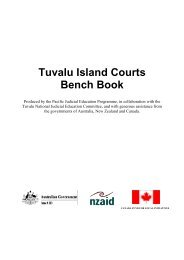Fiji Magistrates Bench Book - Federal Court of Australia
Fiji Magistrates Bench Book - Federal Court of Australia
Fiji Magistrates Bench Book - Federal Court of Australia
Create successful ePaper yourself
Turn your PDF publications into a flip-book with our unique Google optimized e-Paper software.
In a voir dire hearing, evidence should be limited to matters relevant to the admissibility <strong>of</strong> the<br />
disputed evidence. In trials for indictable <strong>of</strong>fences, a voir dire may be held to determine:<br />
• the competency <strong>of</strong> a witness; or<br />
• the admissibility <strong>of</strong> a confession or some other variety <strong>of</strong> admissible hearsay such as a<br />
dying declaration; or<br />
• the admissibility <strong>of</strong> a tape recording; or<br />
• the admissibility <strong>of</strong> a plea <strong>of</strong> guilty against a defendant who subsequently changes his or<br />
her plea to not guilty.<br />
As to how to conduct a voir dire in the Magistrate’s <strong>Court</strong>, see Vinod Kumar v State FCA Crim<br />
App AAU 0024/00, which set out the following procedures:<br />
• Obtain from the defendant at the beginning <strong>of</strong> the trial the precise nature <strong>of</strong> the disputed<br />
statement.<br />
• The prosecution calls its witnesses regarding the taking <strong>of</strong> the caution statement.<br />
• The defendant is given the opportunity to give evidence exclusively on the taking <strong>of</strong> the<br />
caution statement.<br />
• The defendant calls his or her witnesses.<br />
• The <strong>Court</strong> rules on admissibility.<br />
• The prosecution is invited to close its case – no case to answer submission.<br />
• If there is a case to answer, the defendant does not lose the right <strong>of</strong> election.<br />
• Determine what weight is to be placed on the evidence as a whole, including the<br />
interview statement.<br />
• Deliver judgment.<br />
As to the test for admissibility <strong>of</strong> confessions, see Simon Mow v State Crim App 60/2000; State v<br />
Mul Chand Crim Case 3/99; Suren Singh & Ors Crim App 79/2000; R v Smith (1991) 1SCR 714;<br />
R v Black (1989) 2SCR 138.<br />
Relevance<br />
The cardinal rule regarding the admissibility <strong>of</strong> evidence is that, subject to the exclusionary rules,<br />
all evidence that is sufficiently relevant to the facts in issue is admissible, and all evidence which<br />
is irrelevant or insufficiently relevant to the facts in issue should be excluded.<br />
Relevant evidence means evidence which makes the matter which requires pro<strong>of</strong> more or less<br />
probable. Relevance is a question <strong>of</strong> degree and will have to be determined by you, according to<br />
the common law rules <strong>of</strong> evidence and according to specific facts in the case at hand.<br />
<strong>Fiji</strong> <strong>Magistrates</strong> <strong>Bench</strong> <strong>Book</strong> April 2004
















